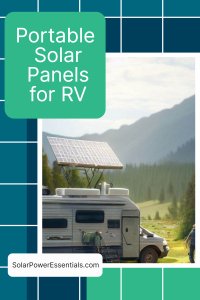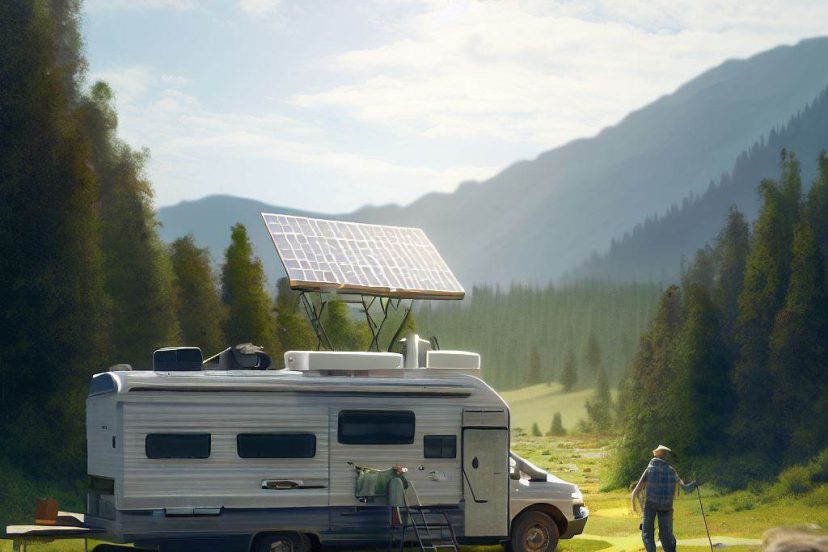Portable Solar Panels for RV: Harnessing the Sun’s Power for Adventurous Travel
As an Amazon Associate, I earn from qualifying purchases, at no additional cost to you. Disclaimer
Introduction
As an avid RV enthusiast and advocate for sustainable living, I have discovered a game-changer for anyone seeking energy independence and the freedom to explore off-grid: portable solar panels for RVs. In this article, I will guide you through the process of understanding, choosing, installing, and optimizing these incredible solar power solutions for your recreational vehicle. Whether you’re a seasoned traveler or just embarking on your first RV adventure, embracing solar energy can enhance your journey and reduce your dependency on traditional electricity sources.
Portable Solar Panels for RV: Understanding Solar Power Systems
To embark on this solar-powered adventure, it’s essential to grasp the basics of solar energy and how it functions in the context of an RV. Solar power systems consist of three main components: solar panels, charge controllers, and batteries. The panels absorb sunlight and convert it into electricity, which is then stored in the batteries via the charge controller. This stored energy can power your RV’s appliances and devices, providing you with the comforts of home even in remote locations.
Benefits of Portable Solar Panels for RVs
Investing in portable solar panels for your RV offers a plethora of advantages that go beyond the mere convenience of having electricity while on the road. Firstly, these panels provide you with the freedom and flexibility to camp in more secluded locations, away from crowded RV parks. You can embrace the serenity of nature without sacrificing the comfort of modern amenities.
Secondly, even smaller portable solar panels can lead to significant cost savings and energy independence. By harnessing the sun’s power, you reduce or even eliminate the need to rely on traditional electrical hookups or noisy generators, which often come with additional costs and maintenance requirements. Instead, you tap into a clean, renewable energy source, reducing your environmental impact while enjoying long-term savings.
Choosing the Right Portable Solar Panel
Selecting the most suitable portable solar panel for your RV requires careful consideration. Start by assessing your power needs. Take inventory of your RV’s appliances, including lights, refrigerator, air conditioner, and entertainment devices. Calculate their energy consumption to determine the wattage you’ll require from your solar panel system.
Quality and durability are vital factors to ensure your investment stands the test of time. Look for reputable brands that offer robust construction and weather-resistant features. Portable solar panels designed specifically for RV use should be able to withstand various outdoor conditions, including rain, wind, and UV exposure.
Portability and size are crucial for RVers constantly on the move. Opt for lightweight and compact panels that are easy to handle and store in your limited RV space. Additionally, consider the panel’s efficiency and power output. High-efficiency panels can generate more electricity with less surface area, allowing you to make the most of limited space.
Click Here for Everything You Need to Power your RV
Portable Solar Panels for RV: Assessing Your Energy Needs
Understanding your RV’s energy needs is a fundamental step in determining the appropriate solar panel size and battery capacity. Begin by calculating your daily energy consumption. Keep a record of how long each appliance is used and multiply it by its power consumption in watts. This calculation will give you an estimate of the energy you consume per day.
Next, consider your battery capacity. Determine how much energy your batteries can store by checking their amp-hour rating. Aim for a battery bank that provides enough capacity to meet your energy needs during periods of low sunlight or cloudy weather.
Determining the Ideal Solar Panel Size
Now that you have an estimate of your daily energy consumption and battery capacity, it’s time to determine the ideal solar panel size. Solar panels are rated in watts, and selecting the appropriate wattage is crucial for meeting your power demands.
To size your panels correctly, divide your daily energy consumption (in watt-hours) by the number of peak sun hours in your location. Peak sun hours refer to the number of hours when the sun’s intensity is strong enough to generate optimal power output from solar panels. This calculation will give you an approximate panel wattage.
It’s advisable to choose a slightly higher wattage to account for future expansions or unexpected increases in energy consumption. Remember, it’s always better to have more power than you need rather than facing energy shortages during your travels.
Assessing Sunlight Exposure
To maximize the efficiency of your portable solar panel system, it’s crucial to assess the sunlight exposure you can expect during your travels. Evaluate your typical travel patterns and consider the seasonal variations in sunlight intensity.
Keep in mind that shading from trees, buildings, or other obstacles can significantly impact solar panel performance. Park your RV in a location where the panels can receive unobstructed sunlight throughout the day. Adjusting the tilt angle and orientation of your panels can further optimize sunlight harvesting.
Selecting the Right Solar Charge Controller
The solar charge controller acts as the intermediary between the solar panels and batteries, ensuring efficient charging and preventing overcharging or damage to the batteries. Two common types of charge controllers are PWM (Pulse Width Modulation) and MPPT (Maximum Power Point Tracking).
PWM controllers are cost-effective and suitable for smaller systems, while MPPT controllers are more efficient and better suited for larger setups. When selecting a charge controller, consider its proper sizing to handle the current and voltage of your solar panel array. Also, prioritize controllers with high conversion efficiency to make the most of the solar energy you generate.
Installing Portable Solar Panels on Your RV
When it comes to installing portable solar panels on your RV, you have two main options: roof mounting or using a portable system. Roof mounting offers a permanent and streamlined solution, utilizing the available space on your RV’s roof. Ensure you follow the manufacturer’s instructions and use appropriate mounting brackets to secure the panels safely.
Alternatively, portable systems provide flexibility and allow you to chase the sun throughout the day. These systems typically come with adjustable stands or ground mounts, making it easy to optimize the panel’s tilt angle and orientation for maximum sunlight exposure.
Wiring and Connection Guidelines
Proper wiring and connection of your portable solar panels are essential for safety and optimal performance. Always use the correct wire gauge to minimize voltage drop and ensure efficient power transfer from the panels to the charge controller and batteries.
Follow the manufacturer’s guidelines for connecting your panels, charge controller, and batteries. Implement safety precautions such as using fuses or breakers to protect your system from overcurrent or short circuits. Consider installing monitoring and metering systems to keep track of your solar power generation and energy consumption.
Maintaining and Caring for Your Portable Solar Panels
To keep your portable solar panels in top condition, regular cleaning and inspection are necessary. Remove any dirt, dust, or debris from the panels using a soft brush or sponge. Inspect the panels for any signs of damage or wear, such as cracked glass or loose connections.
Protect your panels from harsh weather conditions by using covers or awnings when not in use. During winter months, take precautions to prevent snow accumulation on the panels, as it can hinder sunlight absorption. Refer to the manufacturer’s recommendations for specific maintenance guidelines and any warranty requirements.
Tips for Optimizing Solar Power Efficiency
To make the most of your portable solar panel system, consider implementing the following tips:
Embrace energy conservation practices: Opt for energy-efficient appliances and devices. Turn off lights and electronics when not in use, and maximize natural light during the day.
Maintain your batteries: Regularly check and clean battery terminals. Avoid deep discharges and overcharging, as these can reduce battery lifespan.
Adjust panel angle and tracking: If your system allows, adjust the tilt angle of your panels according to the sun’s position throughout the day. Consider investing in solar tracking systems for automatic adjustments.
Monitor your energy consumption: Keep track of your energy usage to identify areas where you can further reduce consumption and optimize your solar power system.
Consider additional energy sources: If you have high energy demands or plan to camp in locations with limited sunlight, consider supplementing your solar power system with alternative energy sources like wind turbines or generators.
Advantages of Using Solar Power
By embracing solar power for your RV, you unlock numerous advantages that go beyond energy savings and convenience. Reducing your reliance on grid electricity allows you to experience the freedom of exploring remote locations without sacrificing modern comforts.
Additionally, solar power is a clean and renewable energy source, contributing to a more sustainable environment. By harnessing the sun’s power, you decrease your carbon footprint and become part of the solution to combat climate change.
Conclusion
Investing in portable solar panels for your RV is a transformative decision that opens up a world of possibilities. From the freedom to camp in secluded areas to the environmental benefits of clean energy, solar power offers a new way to experience the joys of RV travel. By understanding your energy needs, selecting the right components, and optimizing your system’s performance, you can embark on an off-grid adventure while reducing your environmental impact.
Frequently Asked Questions (FAQs)
1. Are portable solar panels suitable for all types of RVs?
Yes, portable solar panels are designed to be versatile and can be used with various types of RVs, including motorhomes, travel trailers, and camper vans. Ensure you choose panels that match your energy needs and RV specifications.
2. How much do portable solar panels for RVs cost?
The cost of portable solar panels can vary depending on factors such as brand, size, and features. Generally, a good-quality portable solar panel kit for RV use can range from a few hundred to several thousand dollars.
3. Can I use portable solar panels while driving?
Yes, you can use portable solar panels while driving, as long as they are securely mounted or stored to prevent any safety hazards. However, it’s advisable to check local regulations and ensure the panels are properly secured to avoid any damage or accidents.
4. Will portable solar panels provide enough power for all my appliances?
The power output of your portable solar panel system will depend on various factors, including panel size, sunlight exposure, and your RV’s energy consumption. It’s crucial to assess your energy needs and choose an appropriately sized system to meet your requirements.
5. Can I expand my portable solar panel system in the future?
Yes, most portable solar panel systems can be expanded by adding more panels or increasing the battery capacity. It’s important to design your initial system with expansion in mind to accommodate future energy demands. Consult with a solar expert or refer to the manufacturer’s guidelines for proper system expansion procedures.





